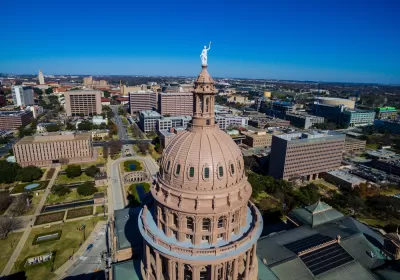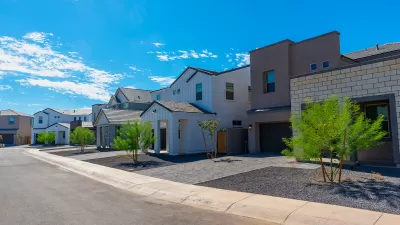State legislatures, frequently acting on behalf of corporate interests, are preempting local reforms and regulations necessary to limit the emissions that cause climate change.

We talk about the power of cities to act aggressively on climate change and equity, but there are many barriers to action. Republican state legislatures, acting to slow down or altogether stop environmental action, are one of the biggest barriers. The Republican party, which historically has advocated for state and local control, has changed its tune in state legislatures as more cities are controlled by Democrats.
Their main tool is preemption—laws by state legislatures that nullify an existing municipal or county ordinance. State legislatures can also create new laws that stop environmental action in its tracks.
Plastic Bags
Let's start with plastic bags. Starting in 2007, several cities have enacted laws to limit or ban plastic bag bans to reduce municipal waste and the amount of plastic waste that makes its way to our oceans. Since then, 19 states have enacted laws that prevent municipal or county governments from prohibiting, taxing, or otherwise regulating the use or sale of plastic containers. Of these, 17 were enacted by Republican legislatures under strong influence from plastic bag manufacturers. During the same 2015 legislative session, Arizona's legislature preempted cities and towns from banning plastic bags and also prohibited local governments from imposing emissions benchmarking requirements or disclosing energy usage.
As with executive orders, preemption can be undone when administrations or legislative control flips. Colorado's legislature is currently acting to undo prohibitions previously imposed on cities that prohibited or limited plastic bags and foam food containers.
Fracking
Local bans on hydraulic fracturing (fracking) have been another target of state preemption. Texas is one of five states that has preempted local bans on fracking. Governor Abbott signed the bill in May 2015, citing the harm of a "patchwork of local regulations" threatening the state's oil and gas production. Never mind the threat to public health that prompted the city of Denton to pass the state's first ban in 2014, despite considerable pressure from the oil and gas industry. Denton was home to close to 300 fracking wells, many of which were built within close proximity to city playgrounds, schools, a hospital, and residential areas, which violated a city ordinance requiring 1,000-foot setbacks.
Buildings and Natural Gas
If cities are to meet aggressive goals to reduce greenhouse gas emissions or become carbon neutral, they’ll have to move fast on reducing fossil fuels in buildings. Co-benefits include reducing energy burden and improving indoor air quality. The interconnected mechanisms available to cities are mandating strict building codes and banning fossil fuel hookups. Both are being preempted.
Berkeley, California was the first city to impose a natural gas ban in 2019. The ordinance bans natural gas hook-ups in new multi-family construction, with some allowances for first-floor retail and certain types of large structures. New construction not covered by the ban must immediately be built for conversion to all-electric in the future. Other California cities have followed by incentivizing or mandating electric appliances in new buildings and offering subsidies for residents in existing housing to purchase electric appliances.
Natural gas utilities noticed. Southwest Gas and its political action committee donated a total of $9,000 to the campaigns of Arizona Senate President Karen Fann and Speaker of the House Rusty Bowers before they introduced a bill that would benefit the gas company by preventing Arizona towns and cities from enacting building codes that would reduce reliance on gas in favor of electricity. The law passed quickly in February 2020 even though no cities had attempted gas bans.
Brookline, Massachusetts passed a similar bylaw in November 2019, but Attorney General Maura Healey reluctantly ruled that the prohibition of oil and gas lines in new and substantially renovated buildings violated existing state law. This is not a case of preemption, but of existing law. Massachusetts is one of about 21 states that do not allow cities and towns to pass energy codes stronger than the state's code. Since banning natural gas hookups is essentially imposing a zero-carbon building standard, it is stricter.
Not to be defeated, in June 2021 Brookline's Town Meeting members passed two proposals that incentivize electrification by placing time limits on applications for special construction permits that are not fossil-free. This approach illustrates how cities and towns can use their land use authority, rather than building codes, to influence construction. While waiting to see if this law passes muster at the state level, Brookline and three other towns are supporting three bills under consideration by the state legislature's Municipalities and Regional Government Committee that would allow Brookline, Arlington, and Lexington to prohibit fossil-fuel infrastructure in new buildings. Advocates of the bill in Massachusetts argue that allowing the three towns to implement the fossil-fuel bans will allow state government to assess impacts before going statewide with the policy. Another proposed bill would allow cities and towns to pass fossil-fuel bans without seeking state permission.
Fossil fuel interests such as the Koch-funded American Legislative Exchange Council (ALEC) and the American Gas Association have been lobbying state legislatures to preempt fossil-fuel bans, which more than 14 states are considering. In addition to Arizona, Texas, Oklahoma, Tennessee, Kansas, and Louisiana have passed laws to preempt cities from banning or limiting fossil fuel hook-ups.
ALEC in fact has written the templates for many of the environmental preemption laws. The Sierra Club reports that ALEC templates were used by 29 state legislatures to preempt local pesticide bans. ALEC also drafted many of the state laws preempting cities to ban or limit fracking and plastic bags. Groups working with ALEC on plastic preemption include the American Chemistry Council (a member of ALEC) and the Plastics Industry Association.
The Threat to Democracy
These and a host of other preemptions on firearms, minimum wages, or paid sick leave, are a threat to local democracy. As I've noted in other posts, some cities are attempting to place equity at the forefront of their climate action. Participation from residents, particularly residents of frontline communities, is the first step. State preemption subverts processes in which residents had a voice in determining a local energy policy. And it will slow down progress on climate change at a time we need to accelerate.
The politics of preemption also involves federal-state relations. The big infrastructure bill working its way through Congress shovels out about $600 billion in new federal money, mostly in grants to states. It imposes some federal standards, but to get Republican support, it does not interfere with existing state preemptions of actions by cities.

Manufactured Crisis: Losing the Nation’s Largest Source of Unsubsidized Affordable Housing
Manufactured housing communities have long been an affordable housing option for millions of people living in the U.S., but that affordability is disappearing rapidly. How did we get here?

Americans May Be Stuck — But Why?
Americans are moving a lot less than they once did, and that is a problem. While Yoni Applebaum, in his highly-publicized article Stuck, gets the reasons badly wrong, it's still important to ask: why are we moving so much less than before?

Research Shows More Roads = More Driving
A national study shows, once again, that increasing road supply induces additional vehicle travel, particularly over the long run.

Judge Halts Enforcement of Anti-Homeless Laws in Grants Pass
The Oregon city will be barred from enforcing two ordinances that prosecute unhoused residents until it increases capacity and accessibility at designated camping sites.

Advancing Sustainability in Los Angeles County Schools
The Los Angeles County Office of Education’s Green Schools Symposium brings together educators, students, and experts to advance sustainability in schools through innovative design, climate resilience strategies, and collaborative learning.

Using Old Oil and Gas Wells for Green Energy Storage
Penn State researchers have found that repurposing abandoned oil and gas wells for geothermal-assisted compressed-air energy storage can boost efficiency, reduce environmental risks, and support clean energy and job transitions.
Urban Design for Planners 1: Software Tools
This six-course series explores essential urban design concepts using open source software and equips planners with the tools they need to participate fully in the urban design process.
Planning for Universal Design
Learn the tools for implementing Universal Design in planning regulations.
City of Moreno Valley
Institute for Housing and Urban Development Studies (IHS)
City of Grandview
Harvard GSD Executive Education
NYU Wagner Graduate School of Public Service
City of Cambridge, Maryland
Newport County Development Council: Connect Greater Newport






























